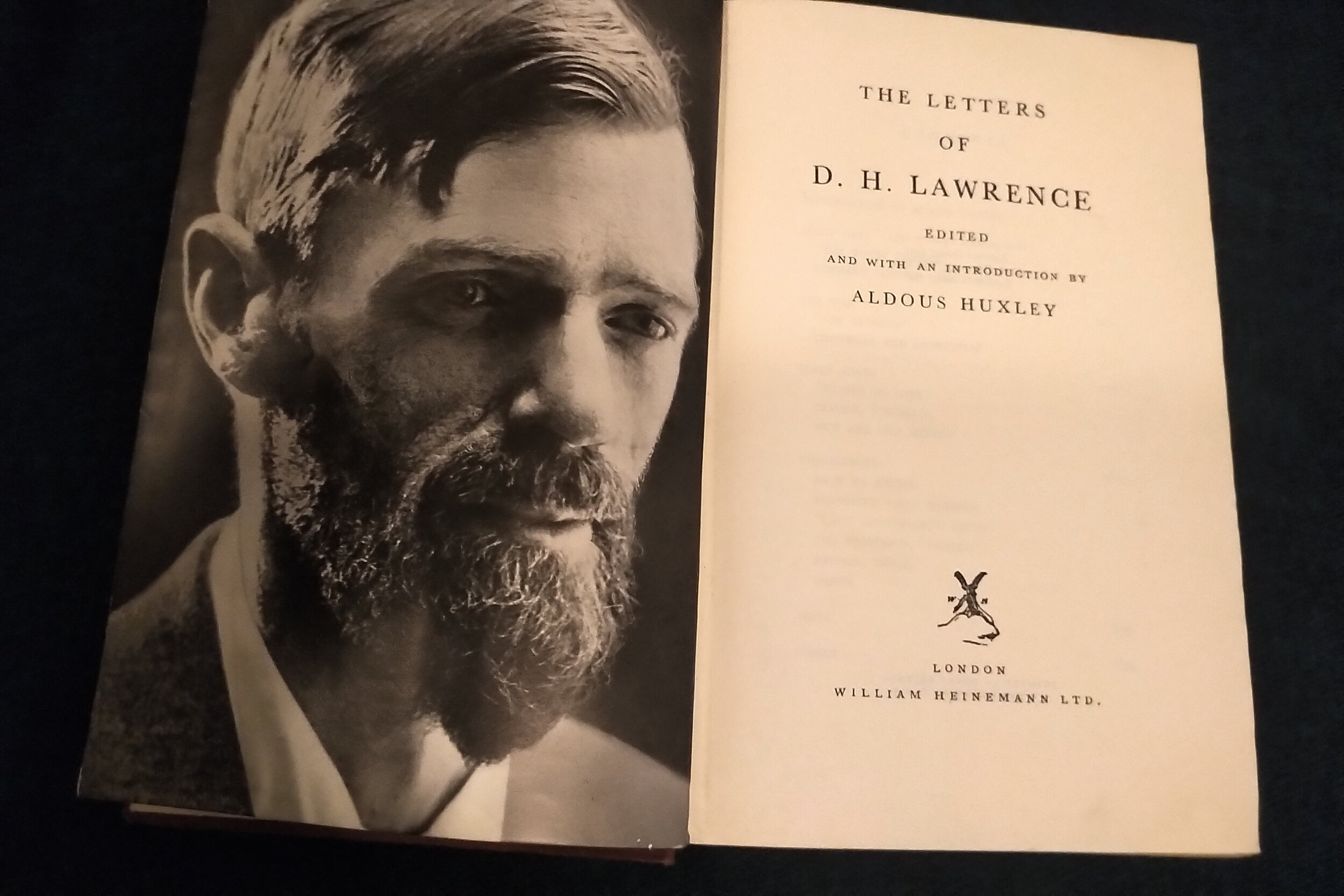Today, 2 March 2020, it’s 90 years since D.H. Lawrence died in Vence, France, at forty-four, of tuberculosis. Though in his letters – the last dwindling few of his short life’s glorious torrent of correspondence – he is still asserting, heartbreakingly, a lesser cause.
To his agent, Laurence Pollinger, he writes, on 20th February 1930 from the Ad Astra sanatorium: ‘I’ve been rather worse here – think I have a bit of ‘flu – pain too.’ To Maria Huxley, also from Ad Astra, on some following Friday, not long after: ‘Seems to me like the grippe, but they say not.’ No, not the ‘flu.
The Letters of D.H. Lawrence, Heinemann, 1932.
Reading these painful, pain-filled entries at the end of my old phoenix-embossed Heinemann hardback edition of The Letters of D.H Lawrence, I was reminded how I first read my way towards that death, the extinguishing of a fierce, creative flame. Racing through extraordinary episodes of a complex life in John Worthen’s D.H. Lawrence: The Life of an Outsider. Freezing post-Christmas days leading up to New Year in Ragusa, Sicily, reading from apartment to coffee bar to aperitivi and back again, knowing – as you do when the diminishing pages warn you – that I was about to reach The End of a Life. And I was amazed to be so utterly devastated at the details of the death I knew was coming all along. You know the dates, but the evocation of a life in a good biography makes the loss freshly shocking.
Every year at Blake Friedmann, as we head off to our agency Christmas lunch, we post a list of our Top Three Picks of the Year: three special things colleagues have read or watched or heard or seen in the past year (excluding our own clients’ work). Things that have struck us and we believe will stay with us. As, six years later, The Life of an Outsider has. I checked back to 2014 and found my description of that experience, remembering how I sat on the bed in the apartment and sobbed, so that Jan thought something newly terrible had happened.
Dipping into the Letters and the well-thumbed pages of the sepia-toned Penguin paperback biography set me off again tonight. It was always going to be a turbulent journey, with Lawrence and all his ranting and tramping (as Geoff Dyer puts it) around the world.
I’m copying in my notes from 2014 below, with thanks to my fellow traveller, artist Douglas Robertson, for giving me the biography years ago, an early seed in a fruitful collaboration. And with acknowledgement to the other inspiring writers in that post, most no longer with us. Avanti.
Isobel’s Top ‘Keepers’ of 2014 (from the Blake Friedmann website)
[Three, only three, Ed.? Really? Oh, okay, here goes…
D.H. Lawrence: The Life of an Outsider by John Worthen (Penguin, 2006)
My first non-agency Book of the Year, literally, was John Worthen’s absorbing biography of D.H. Lawrence (Penguin). The paperback was a gift to me from artist Douglas Robertson, when we launched into our poetry-art collaboration based around Lawrence’s Birds, Beasts and Flowers. I finished it on New Year’s Day in Sicily – not in Taormina where Lawrence lived, but in Ragusa, which still felt appropriately close to the tracks of this fierce, complex poet-novelist who wrote and travelled so much. I knew of course that he died tragically young at forty-four and as I read I could see how few pages of the book were left (pages, real pages, not just 70% complete etc…!), so I was surprised to be so overwhelmingly moved when the moment of his death came. Worthen brought the contradictions, the rage, the passion and the ambition so vividly to life, and though Lawrence was by no means always a likeable man, I wept bitterly at the book’s close.
I loved the verve and originality of Glyn Maxwell’s On Poetry (Oberon), a book on the reading and writing of poetry like no other I have read. I know I will keep returning to it with relish.
Michael Donaghy was a brilliant poet and performer and an inspiring teacher whose evening class gave me my first sense of a poetry ‘home’ in London. He died ten years ago this September and his absence is still keenly felt by so many. His Collected Poems (Picador), with its Introduction by Sean O’Brien will introduce many new readers to his fine poems – I have been reading them with a bittersweet mixture of admiration, sadness, re-discovery and consolation.
And right now I am delighting in the much-anticipated Bedouin of the London Evening (Bloodaxe) by the late, enigmatic Rosemary Tonks and Clive James’s lively Poetry Notebook (Picador) … [What? That’s it, Ed? Too much already? And I was just getting started…. What about the films, the plays, the music, the novels… ? Ah. Another time.]
But [as Ed. looks the other way, absorbed in guessing who his Secret Santa is from] I have to put in a swift late mention of Shirley Jackson’s brilliant, darkly Gothic novel, We Have Always Lived in the Castle. I know I’m a latecomer to her genius and can’t wait to read more (and know I will re-read this too – what a great character Merricat is, one of my line-up of deliciously unreliable narrators).
For more on my D.H Lawrence Birds, Beasts and Flowers project with Doug Robertson, see here.

